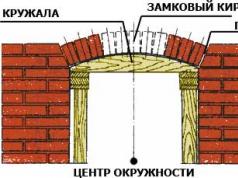The participles have only present and past tense forms. The forms of the future tense in the participles are not fixed, which is due to the presence of the imperfect form of the composite future tense in the verbs (it is impossible to form a participle from "I will write").
From the verbs of nes. species form the participles of the present and past tense, and from the verbs of owls. species - only past participles.
The participle tense forms can have both absolute and relative meanings.
Relative participle time
Full forms of participles, which perform the function of definition in a sentence, most often have a relative meaning. In this case, the type of relative time of the participle (relative previous or relative simultaneous) depends on the type of participle, as well as on the temporal form of the predicate verb used in the sentence.
|
participle |
predicate-verb |
value is related. communion time | |
|
nesov. v. present and last time. |
in the form of the past. time. |
simultaneity |
I lay on my back and saw the clouds floating quietly above me. |
|
nesov. v. present |
in the form of the present. or bud. time. |
simultaneity |
I lie on my back and see clouds floating quietly above me. |
|
nesov. v. last time. |
in the form of the present. time. |
precedence |
Today on the street I meet an actor who played in the "Forest". |
|
owls. of the kind |
in the form of ave., present, bud. time. |
precedence |
The extinguished ash will not flare up (P.). |
Absolute sacrament time
1. Full participle forms are less likely to indicate absolute time. As a rule, absolute tense is expressed by the past participles with future tense verbs ( To the mentors who kept our youth ... not remembering evil, we will reward for the good (P.)).
2. Absolute tense can be expressed by short participles that are part of a compound nominal predicate.
If such a predicate includes the zero form of the conjunction with the meaning of the present tense, then the participle indicates the presence in the present tense of the result of an action performed in the past ( The laundry is dry. The article is outlined.).
If the predicate contains a conjunction in the form of the past tense, then the participle shows that the result of an action performed in the past is also referred to the past tense ( The linen has been dried. The article was outlined.).
5. Collateral meanings of participles
The hypothetical meanings of the participles require special characterization.
Passive participles- these are always passive participles.
As for valid participles, then among them may be:
a) active participles ( little boy reading a book);
b) passive participles (necessarily with the postfix -sya): a story written by the author;
c) participles returnable pledge ( hugging friends);
d) participles outside the pledge category, formed from non-taxable verbs ( stone lying on the road).
Thus, we can conclude that the concept of "active participle" is much broader than the concept of "active participle". DP with the postfix –sya, which have the meaning of the passive voice, are used only when the corresponding passive participle is not formed or is of little use:
A house built by workers. - A house built by workers is not formed.
A house being built by workers. - A house built by workers is of little use.
The synthetic form is formed by attaching an affix -sche / -єche to the stem of the verb. Analytical form - a combination of the present tense in the third person + -th / -и / -а / -´ + auxiliary verb trader:
eshlґєche keshe - ashli torgan keshe - a working person;
baruchy kyz - bara torgan kyz - walking girl.
The analytical form denotes a feature of an object that is more permanent than a feature expressed in a synthetic form.
Some participles pass into nouns without change, forming the names of professions:
ochuchi (flying, pilot); ukytuchy (trainer, teacher); satuci (seller, seller).
Past participle
The past participle in its form coincides with the indefinite past tense in the 3rd person: bargan (descended), kitkґn (departed):
Keshe kitkn. - The man is gone.- an indicative verb in the form of an indefinite past tense;
Kitkun keshe. - Departed man... - past participle.
As you can see from the examples, it will not be difficult for you to distinguish them, because in a sentence, the participle is always a definition and answers the question nindi? (which?).
Future participle
The situation is about the same as with the past participle, but there are three forms of the participle in the future tense. The first is similar in form to a certain future time, the second - with an uncertain future, and the third is unique in its own way. It is formed by attaching the affixes -asy / -se; -ysy / -ise to the stem of the verb. In order not to confuse it with a conditional verb, it must be remembered that the participle always defines a noun and stands in front of it:
kilґchґk kyn - future day; kilґse ate - next year.
Future participles are often translated into Russian by participial phrases:
a language like a novel is a novel to be written; killer k¿n - the day that will come; barasy ўir - the place where we will go (we need to go).
7.4. Verbal participle (хґл figyl) describes an additional action that occurs in addition to the main action, or provides additional information about the main action. In the Tatar language, gerunds are used much more often than in Russian: they serve to create numerous analytical forms of the verb. In combination with auxiliary verbs, the gerunds carry the main meaning of the action.
There are four adjective forms in the Tatar language:
1) the most common form is formed by attaching the affix -yp / -en / -p to the stem of the verb. It is this form that is involved in the formation of analytical verbs:
basyp torah - standing (standing, standing)
language beterґ - finishes writing (adds).
In combination with auxiliary verbs for translation, you need to know the meanings of auxiliary verbs (more on this in the next paragraph).
2) the second form of the participle is formed by attaching the affix -ganche / -gґnche / -kanchy / -kґnche to the stem of the verb. This form of participle can have two meanings:
1. Anda bargans, min concert to bars.
Before going there, I will go to the concert.
2. Anda bargans, min concert to bars.
Instead of going there, I will go to the concert.
In the first case, the verbal participle denotes an action that preceded the main one. In the second case, the action that the subject intends to do instead of the main one.
You can choose the correct translation only based on the context. At the initial stage, we limited ourselves to only the first value, but you will have to master the second value on your own at a later stage of training.
3) the third form of the participle is formed by attaching the affix -gach / -gґch / -kach / -kґch to the stem of the verb.
Anda bargach, min cinema karyim.
When I get there (after I get there), I will watch a movie.
Ul kilgґch, min kitґm.
When he comes, I'll leave.
4) the fourth form - steam room: bar-bar (walking); sıılґshґ-sıılґshґ (speaking, speaking). The Russian reader quickly gets used to this form, but it must be remembered that the paired form of the participle is used to express a repetitive or prolonged action.
Kyzlar, sıylґshґ-sıylґshґ, suga kittelґr.
The girls, talking among themselves, went to fetch water.
THE EXERCISE
Form four forms of a participle from these verbs and translate:
Sample: kilā - kilep (having come); kilgance (before coming; instead of coming); kilgґch (after coming); kilґ-kilґ (coming).
Yazu, baru, kitє, ashlґє, sanau, chygu, toru ( be, stand).
7.5. Auxiliary verb "ide"... This verb does not have its exact meaning and can be combined with both names and different forms of the verb. This verb always indicates the past tense.
In combination with the names, it coincides in meaning with the Russian verb “was, was, were”.
Min ukytuchi go. - I was a teacher.
Alar 1987 nche elda studentlar ide. - They were students in 1987.
In combination with verb forms, it forms analytical tenses:
1) a verb in the present tense + ida, accepting personal endings of the second type:
Min yaza go. - I wrote.
Sin seyli ideј. - You said.
This is the form past unfinished tense denotes an ongoing or recurring action in the past. This is the only meaning of this form, of course, is not exhausted: there is always a shade of duration and incompleteness of the action.
2) a verb in the form of an indefinite past tense + ide, accepting personal endings of the second type:
Min yazgan, let's go. - I (once) wrote.
Sin sıylґgґn ideј. - You (once) spoke.
This past tense form denotes an action that occurred in the distant past, or repeated in the past.
3) a verb in the form of the present tense + Torgan ida, which also accepts personal endings of the second type. This is how the form is formed elapsed multiple tense:
Min yaza trader go. - I used to tell.
Sin seyli tragan ideј ... - You used to tell.
This form of the past tense denotes an action that is systematically repeated in the past.
Of course, it is possible to memorize these analytical forms of the times, but only in the constant practice of oral and written speech can you work out their semantic shades and correct application.
THE EXERCISE
Put these verbs in analytical past tense forms and translate them:
Sample: kilā - kilā ide (came); kilgan ida (once (once) came); kilґ tragan ida (used to come).
Yazu, baru, sıylґє, ashlґє, chygu, kitє.
Now remember the synthetic past tense forms of these verbs and compare them with the analytical forms:
Sample: kilā - kilde (came); kilgn (it turns out he came).
An auxiliary verb can be attached to other forms of a semantic verb, thus forming an analytical verb.
Here knowledge of the Russian language will help you: in the Russian language there is a particle "would", which is, as it were, not accomplished "to be". It is this particle that will help you translate analytical forms from ide.
1) yazar id - would write (denotes an action that, under a certain condition, would take place in the future):
Addresyn belsґm, hut yazar, let's go. - If I knew his address, I would write a letter (I want to write).
2) yazgan bulyr we go - would write (denotes an action that, under a certain condition, would have taken place in the past, but did not take place):
Addressin belgun bulsam, khat yazgan bulyr we are going. - If I knew his address, I would write a letter (I will not write it anymore).
3) baryrga ide, yazasy ide - to go, write to (expresses the desire to perform an action expressed by the main semantic verb):
Бgen kinoga baryrga ide. - I would like to go to the cinema today.
Kichen khat yazasy ide. - In the evening I should write a letter.
4) yazmakchy ide - I would like to write (I intended to write). Intention verb construction -makchy / -mґkche bula is dealt with in paragraph 8.
Min aјa khat yazmakchy let's go. - I wanted to write him a letter (I intended).
5) yazsyn id - let him write (expresses the urge to perform an action, expressed by the main semantic verb).
Nigґ ul khat yazmady so? Yazsyn ide! - Why didn't he write the letter? Let him write!
6) Combined with a conditional verb yazsa ide the auxiliary verb is translated by the particle "would". In this way, the conditional verb is put in the past tense:
Ul miјa khat yazsa ide, min kilgan bulyr we go. - If he wrote me a letter, I would come.
THE EXERCISE
Translate analytical verbs:
baryr go; kitur we go; uylarga (to think) ide; Yazasy ide; kitsen ida; chyksyn ide; kilmākce ida; leopard ide.







